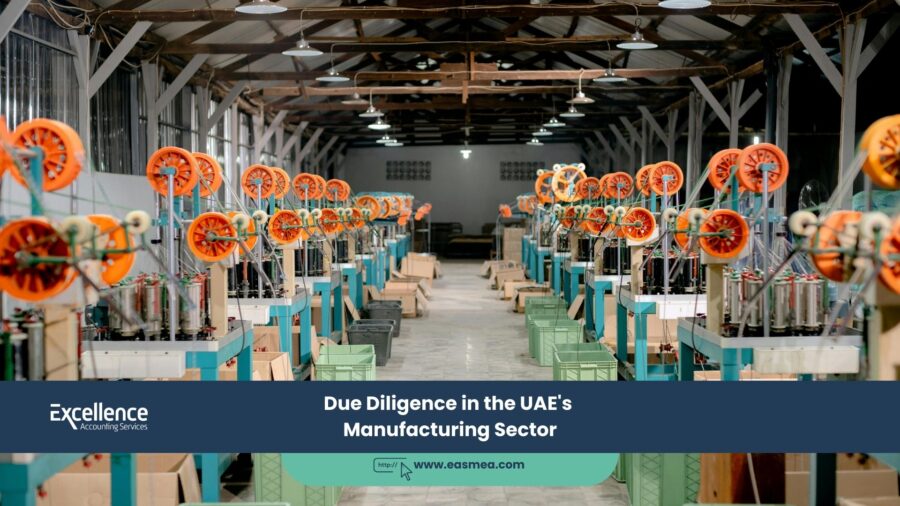A Guide to Due Diligence in the UAE’s Manufacturing Sector
The UAE’s ambition to become a global industrial powerhouse, spearheaded by initiatives like “Operation 300bn,” has made its manufacturing sector a prime target for investment and M&A activity. Acquiring a manufacturing business, however, is a fundamentally different challenge than buying a service or technology company. The value and risks are deeply embedded in tangible assets, complex operational processes, and a web of specific regulations.
- A Guide to Due Diligence in the UAE's Manufacturing Sector
- Why Manufacturing Due Diligence is a Specialized Field
- The Core Components of Manufacturing Due Diligence
- Your Integrated Partner for Manufacturing M&A: Excellence Accounting Services (EAS)
- Frequently Asked Questions (FAQs)
- Considering a Manufacturing Acquisition?
For any potential buyer or investor, **due diligence** in the manufacturing sector is a multi-disciplinary deep dive that goes far beyond the financial statements. It is a hands-on investigation of the factory floor, the supply chain, the condition of the machinery, and the company’s compliance with a host of environmental and labor laws. Failing to conduct this specialized due diligence can mean inheriting a factory with obsolete equipment, a fragile supply chain, or significant hidden environmental liabilities.
This guide provides a comprehensive framework for conducting due diligence on a manufacturing company in the UAE. We will explore the critical areas of investigation—from operational efficiency to environmental compliance—that are essential for making a sound investment decision.
Key Takeaways
- It’s More Than Financials: Due diligence for manufacturing is heavily focused on operational, technical, and environmental factors that don’t appear on a standard balance sheet.
- Operational Due Diligence is Key: Assessing the physical condition of machinery, production capacity, and supply chain stability is paramount to understanding the true health of the business.
- Hidden Liabilities are Common: Environmental non-compliance and unfunded capital expenditure (CAPEX) for aging equipment are two of the biggest hidden risks.
- Location Matters: The specific rules and benefits of operating in a mainland industrial area versus a specialized free zone (like KIZAD or Jafza) must be a key part of the legal due diligence.
- A Multi-Disciplinary Approach is Required: A thorough investigation requires a team of experts, including financial analysts, operations specialists, environmental consultants, and legal counsel. A comprehensive due diligence process integrates these findings.
Why Manufacturing Due Diligence is a Specialized Field
Unlike a software company where value lies in code, a manufacturing business’s value is tied to its physical ability to produce goods efficiently and reliably. This introduces several unique layers to the due diligence process:
- Tangible Asset Risk: Machinery breaks down, becomes obsolete, and requires significant maintenance. The valuation must account for the real condition and future cost of these assets.
- Operational Complexity: The efficiency of the production line, the quality of inventory management, and the stability of the supply chain are all major drivers of profitability.
- Regulatory Burden: Manufacturing is a highly regulated sector, with strict rules governing environmental impact, waste disposal, and worker health and safety.
In manufacturing, the financial statements tell you the results of the operation. The due diligence process investigates the health of the operation itself.
The Core Components of Manufacturing Due Diligence
A robust due diligence process for a manufacturing target is a comprehensive audit of every aspect of the business.
1. Financial Due Diligence
This is the starting point, but with a specific manufacturing focus.
- Quality of Earnings (QoE): A deep dive to determine the sustainable, recurring profit of the business, adjusting for any one-off events or accounting anomalies.
- Working Capital Analysis: This is critical. The analysis focuses heavily on **inventory**, checking for obsolete stock, assessing the valuation method, and verifying physical counts against the books.
- Capital Expenditure (CAPEX) Analysis: Reviewing the history of investment in machinery and forecasting future CAPEX requirements. A business that has been under-investing in its equipment may have a large, unfunded liability for a new owner.
- Gross Margin Analysis: Analyzing the gross margin by product line and customer to identify the true drivers of profitability.
2. Operational Due Diligence (O.D.D.)
This is the “walk the factory floor” part of the investigation.
- Production Process Review: Assessing the efficiency of the plant layout, production workflow, capacity utilization, and identifying any bottlenecks.
–
Machinery and Equipment Assessment:
- A physical inspection of key machinery to assess its condition, maintenance history, and remaining useful life. This may require an independent engineering assessment.
- Supply Chain Due Diligence: Analyzing contracts with key suppliers, assessing the risk of dependence on a single supplier, and reviewing the logistics of inbound raw materials and outbound finished goods.
3. Legal and Regulatory Due Diligence
This ensures the business is operating on a sound legal footing.
- Licenses and Permits: Verifying that the company holds a valid industrial license and all other necessary permits to operate.
- Compliance with Labor Laws: Auditing employment contracts, visa statuses, and accommodation standards (if applicable) to ensure full compliance with UAE Labour Law.
- Real Estate: Confirming clear title to the factory and land, or conducting a thorough review of the lease agreement and its terms.
4. Environmental, Health, and Safety (EHS) Due Diligence
This is a critical area that can uncover significant hidden liabilities.
- Environmental Compliance: An audit of the company’s adherence to all federal and local environmental laws regarding waste disposal, air emissions, and hazardous materials.
- Phase I Environmental Site Assessment (ESA): For any property involving industrial processes, a Phase I ESA is highly recommended to investigate the potential for historical land or groundwater contamination.
- Health & Safety Audit: A review of the company’s safety procedures, accident logs, and compliance with worker safety regulations to identify potential liabilities and risks.
Your Integrated Partner for Manufacturing M&A: Excellence Accounting Services (EAS)
A successful manufacturing acquisition requires a holistic understanding of how the operational realities impact the financial results. EAS provides the integrated due diligence needed to make an informed decision.
- Comprehensive Due Diligence: We lead the financial due diligence process and work seamlessly with technical, legal, and environmental experts to integrate all findings into a single, cohesive analysis of the business.
- Expert Business Valuation: Our valuations for manufacturing companies go beyond the numbers, explicitly factoring in the financial impact of our findings on future CAPEX needs, operational risks, and potential liabilities.
- Strategic CFO Services: We provide post-acquisition support to help you integrate the new business, manage its financial performance, and realize the synergies identified during due diligence.
Frequently Asked Questions (FAQs)
A financial audit provides an opinion on whether the historical financial statements are accurate. Due diligence is a forward-looking investigation designed to assess the quality of earnings, identify risks, and validate the assumptions behind a potential investment.
It is absolutely essential. You cannot conduct proper operational due diligence without walking the factory floor, observing the production process, and seeing the condition of the equipment firsthand.
A QoE report is a detailed analysis that adjusts a company’s reported EBITDA to arrive at a “normalized” or sustainable level of earnings. It is a core component of financial due diligence and is crucial for determining the valuation.
This often requires hiring an independent, specialized equipment appraiser. They will assess the machinery’s physical condition, its technological relevance, and its fair market value, which may be very different from the book value on the financial statements.
This is the risk that the business is critically dependent on one single supplier for a key raw material or component. If that supplier were to fail or significantly raise prices, it could cripple the manufacturing operation. Due diligence must identify and quantify this risk.
This becomes a major negotiating point. The buyer can demand that the seller cleans up the contamination before the sale (remediation), or they can negotiate a significant reduction in the purchase price to cover the future cleanup costs and associated risks.
Advantages can include 100% foreign ownership, streamlined customs procedures for import/export, excellent logistical infrastructure, and potential tax benefits under the Corporate Tax law. The due diligence must verify the company is in full compliance with the specific Free Zone’s regulations.
Given the complexity, a thorough process involving financial, operational, and environmental streams can take anywhere from 4 to 12 weeks, depending on the size and complexity of the operation.
These are performed by specialized, independent consulting firms. The financial advisors (like EAS) will then integrate the findings from these technical reports into the overall financial analysis and valuation.
A major red flag is a history of significant under-investment in capital expenditure (CAPEX). A company that has been “sweating its assets” without reinvesting in maintenance and upgrades is likely hiding a huge future liability for the new owner.
Conclusion: A Blueprint for a Sound Industrial Investment
Investing in the UAE’s manufacturing sector offers a powerful opportunity to participate in the nation’s industrial growth. However, success requires a level of diligence that matches the complexity of the assets and operations involved. A thorough, multi-disciplinary due diligence process is the essential blueprint that allows an investor to look beyond the surface, understand the true state of the factory, and make an investment based on a solid foundation of facts.
Considering a Manufacturing Acquisition?
Contact Excellence Accounting Services to lead a comprehensive due diligence process for your next industrial investment.




